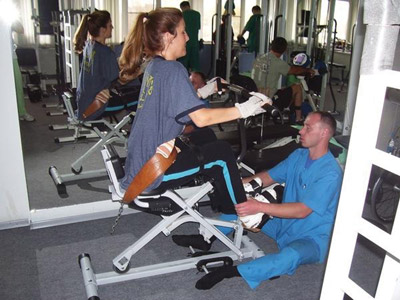
spinal cord injury. In 2005, Blochlinger, an exercise science graduate
and a rehabilitation therapist, founded First Step, a Dallas-based
rehabilitation company.
Nito Blochlinger ’02 once dreamed of working with a pro sports team. But reality had something else in store for this WSU track and cross country letterman.
After earning a bachelor’s degree in exercise science, he landed an internship with Project Walk of Carlsbad, Calif. That experience led him to become a spinal cord injury specialist.
His interest in the field grew, and in 2005 he founded First Step, a Dallas-based company with the goal of helping those who have experienced a spinal cord injury or disease.
“I’ve always wanted to make a difference,” he says. “I also watched a lot of sports. I saw people get spinal cord injuries and wondered what they did for rehab, how they got better. I saw some people who regained their ability to walk, and others who didn’t. I became very interested in the process of how they learned to deal with their injury.”
He explains that spinal cord injuries happen rapidly, with a traumatic blow that fractures or dislocates vertebrae, creating a compression that crushes and destroys extensions of the nerve cells which carry signals up and down the spinal cord between the brain and the rest of the body. According to a 2006 report, an estimated 11,000 Americans suffer such injuries each year.
Although life expectancy for a spinal cord injury victim is greater now than in past decades, persons with significant injury may expect to die at an earlier age because of complications. Not all spinal cord injuries result in paralysis, but many do, and impaired movement is rarely the only problem people with such an injury develop.
Respiratory complications are common, as is a range of emotional disorders. “We encounter a lot of people who are very depressed,” Blochlinger says. “When someone suffers that kind of injury, they can lose hope.”
Yet, like many rehabilitation therapists, he has seen clients overcome great odds in order to return to a largely normal life. (First Step also treats those affected by traumatic brain injury, cerebral palsy and multiple sclerosis.) He recalls one client who’d been told he had less than a three-percent chance of walking again.
While the client was immobile for some time, repetitive exercise eventually enabled him to move his toes. “Then he started moving his arms and started experiencing burning and tingling in his legs. Then he started moving his legs. He got to the point where he could stand — and then to the point where he could walk,” Blochlinger says. “For someone to get to the stage of walking again is rare. But that doesn’t mean that others can’t gain independence.”
Physical rehabilitation can be a daunting task for both therapist and client. Clients work between three and five hours a day, three to five days a week. Blochlinger says a good sense of humor goes a long way in maintaining a healthy perspective.
“A lot of my clients like to have a good laugh,” he says. “I try to keep my own attitude as positive as possible and keep the atmosphere around us the same way. There is a lot of joking that goes on, and we try to take everything as it is.”
Humor was also key during the early days of First Step, Blochlinger relates. Becoming the CEO of his own company presented many challenges, he says, challenges he met with the support of friends and his parents (who own a barbershop in his native Minneapolis). “They helped show me the ropes. Having my own business has had its ups and downs, but I’ve learned a great deal the more I’ve been at it.”
Keeping at it: maybe that’s the secret to taking his business from first step to full stride.





